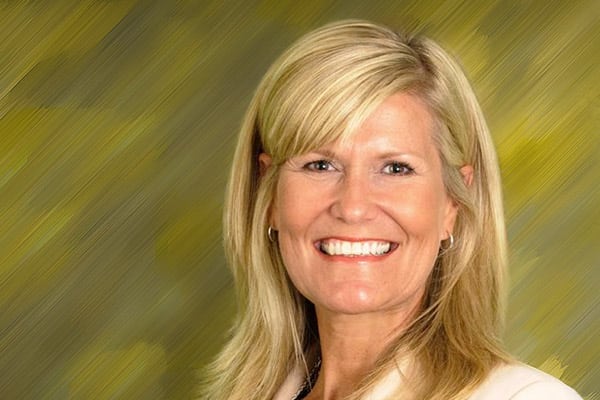

PAYING IT FORWARD:
Lisa Benson Ray
Lisa Benson Ray, regional executive of Arvest Bank in Springdale, was born and raised in California. Little did she know, she would live all over Los Angeles, miss a chance to appear in the first Rocky film, try to join the Navy, work for nine years to finish her Bachelor’s degree, meet her husband in a cave, move to northwest Arkansas, and eventually become one of Arvest Bank’s first female bank presidents.
Here’s her surprising, hilarious, and heart-warming backstory:
Lisa’s earliest memory is of her first lesson in right and wrong. She was three or four years old, and she envied a tiny, pink bicycle with training wheels that belonged to one of the neighborhood girls. One day when the girl’s family was away, Lisa snuck over to their house and “borrowed” it, hiding it in her own family’s garage. When her parents discovered it, they explained new truths to her that she hadn’t understood, that because the bike belonged to her friend, it was wrong for Lisa to take it and put it in their garage. Her parents made her walk back to the house with the bicycle, knock on the girl’s door, and apologize to both her and her parents. The little girl became Lisa’s first real friend, and her family taught Lisa another valuable lesson: they were the first African-American family Lisa had ever known. As Lisa spent time with their family, she learned at a very young age that all people are exactly alike, “all with red blood rolling through our veins.”
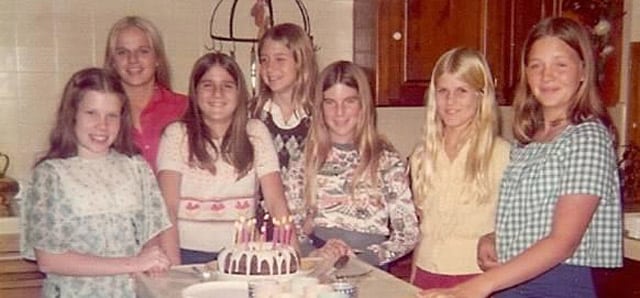
In tenth grade, after Lisa’s parents had divorced, she moved with her mother to North Hollywood and began attending high school in North Hollywood. “North Hollywood is where a lot of the movie industry people lived and sent their kids to school, but it wasn’t the super famous people. It was the people behind the camera. The show Little House on the Prairie was a big deal at the time, and a couple of girls in my math class were the daughters of the actor that played Mr. Edwards. My friend, Shannon Williams, was the niece of John Williams, the composer for Star Wars. That school was rough for me. I had never been exposed to drugs or alcohol. I was this blonde, naive girl. My first day, I met a girl in one of my classes who asked if I wanted to go smoke a cigarette in the bathroom with her. I said no, but she invited me to come anyway. She offered me a drug, but at first I thought it was candy and I will be forever grateful that I declined! I decided right away that it would be better to have no friends than the wrong friends. It was a completely different world from where I was raised.” After only one semester at North Hollywood High, Lisa transferred back to La Cañada High School, where her dad was a teacher. It was 30 miles away, so she used her mother’s car, dropped her mother off at work, drove to school, did homework for a couple of hours, picked her mother up from work, then she herself went to work. The school was one of the best in the state, which would serve Lisa well later on.
Lisa’s mother had always dreamed of being an actress. She had been the leading lady in every school play, and got into the movie industry once her kids were self-sufficient. She played leading roles in small movies, and small roles in bigger movies. She usually played an extra, and she pulled her children into that line of work too. Lisa says, “I never wanted to be in the movies, but I did it when I was a kid, because you could make more money doing that than working at Wienerschnitzel.” Lisa made it into a couple of episodes of the show Eight Is Enough, and played other small bit parts in the ‘70s and ‘80s.
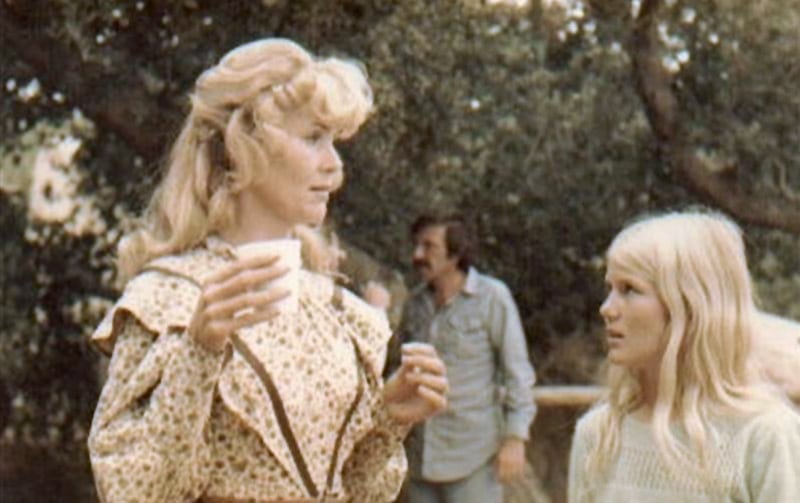
Lisa also helped work on the first film of the Rocky trilogy. “Mom and I had this agent, Pearl, who did a lot of low-budget movies. If Pearl was looking for someone to help fill a stadium in a movie or something, she would call me, because she knew I didn’t want to try out for anything, I just wanted to show up and make $50 – $150 in a day. I was only fifteen, but Pearl and I had become friends. One day she called me and said, ‘I need to fill a forum for this low-budget movie, but they aren’t going to pay anyone. I know you won’t miss school to do it, but I want to pay you to help me think about it.’ I asked her to tell me more about it. She said, ‘Well, they’re going to bring in Kentucky Fried Chicken box lunches, and it’s for people who just want exposure in the movies.’ I asked, ‘Is there anyone in it that anyone would know?’ She said, ‘No, it’s really low-budget. The lead is this unknown named Sylvester Stallone. It’s really just for people who want to show up.’ I had the idea to call all the local school drama clubs to see if the teachers would let students participate as a project. Several of my friends from school did it, and you can see them clearly in the movie. I think Mom was in that one. I didn’t do it though. Later, when we all went to see it, we thought, ‘Wow, that was actually a pretty good movie!’”
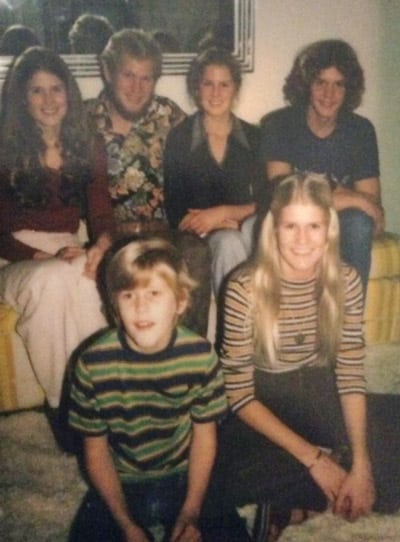 Lisa worked very hard to make good grades all through high school so that she could get college scholarships. She was valedictorian of her class. But no one–not her high school counselor, not her parents, none of her teachers–told her that she needed to actually apply for scholarships in order to get them, so she received none. When her acceptance letters came in, her family couldn’t afford to send her to the schools she wanted. A couple of years before, Lisa’s mother had married a millionaire who didn’t believe in college education, who had claimed her as a dependent, so she was also disqualified from all need-based scholarships. Lisa’s was determined go to college, so she quickly applied to less prestigious schools and was able to register at Cal State Northridge. “I think it cost maybe $250 a semester, at the time. I was able to scrounge it up. I think my mom helped me buy books my first semester.”
Lisa worked very hard to make good grades all through high school so that she could get college scholarships. She was valedictorian of her class. But no one–not her high school counselor, not her parents, none of her teachers–told her that she needed to actually apply for scholarships in order to get them, so she received none. When her acceptance letters came in, her family couldn’t afford to send her to the schools she wanted. A couple of years before, Lisa’s mother had married a millionaire who didn’t believe in college education, who had claimed her as a dependent, so she was also disqualified from all need-based scholarships. Lisa’s was determined go to college, so she quickly applied to less prestigious schools and was able to register at Cal State Northridge. “I think it cost maybe $250 a semester, at the time. I was able to scrounge it up. I think my mom helped me buy books my first semester.”
Lisa was only seventeen years old when she began college. A couple of months later, when she turned eighteen, her mother’s husband gave her a week or two to move out, on her own. Desperate, Lisa decided to join the Navy. She found a path that would allow her to serve for four years in exchange for the Navy paying for college tuition. She performed all the tests and physicals, and she had an appointment with the recruiter to sign her enrollment paper. The night before she officially enlisted, Lisa’s friend Linda invited her to have dinner at their house. “I thought I was just going to dinner. But Linda’s mom, Caroline, said, ‘Well, Lisa, I hear you’re joining the Navy.’
I said, ‘Yep, I’ve got an appointment at 8 o’clock tomorrow.’
She said, ‘That’s nice. But do you feel like this is the same decision you would make if you had three months to decide?’
I said, ‘There’s no doubt, if I had three months I would not be joining the Navy. But in a week I won’t have a place to live. My job won’t support me. This will provide all the things I need.’
Then Caroline said, ‘How about this: Linda and I have talked about it, and her room is big enough for two girls. Why don’t you stay with us and pay us rent, maybe $100 a month, and just stay for three months. Then, in three months, if you still want to join the Navy, at least you had some time to think about it.’
“So I moved in with them for three months. I got a full time job during the day at Coldwell Banker Real Estate, and I was taking night classes. I was trying to figure out what I could afford. I looked at a bulletin board at my college, and I found one room I could afford. It was a two bedroom apartment, and I would be the fourth person. Turns out, three guys shared the big master bedroom, and there was a teeny tiny side room with a bathroom where I would live. So I moved in. It was very much like The Big Bang Theory. Those three boys were just like the guys on the show. They thought it was the coolest thing ever to have a girl roommate.
“When I was moving in, Caroline gave me a card, and in it was the $300 I had paid her for rent. She said, ‘Lisa, it is really hard for people to have a rainy day fund. So this is for your rainy day fund. Put as much of it aside as you can.’ About a month later, the transmission blew on my 1970 Ford Torino, and it took almost every bit of that $300 to pay for it. If she had not done that for me, I don’t know what I would have done. Caroline taught me about saving money, but she also taught me another lesson: before the phrase was even around, she told me to pay it forward. That’s always been in my mind.”
Lisa’s story meanders a bit: after her freshman year at Cal State Northridge, her father decided to divorce his fourth wife and offered to let Lisa stay with him for free in his apartment in Glendale. She stayed on his couch and went to Glendale Community College full time, working on campus. She got very involved at Glendale: she became women’s student president, then student body president. Then, she got a full ride to Brigham Young University at Provo. She spent a year there. Lisa wasn’t active in the Mormon church, but she loved her time there. Then she took some time off of school and got a full-time job at Pepsi-Cola. She got several promotions, but finally reached a point where she could not be further promoted without a degree. Pepsi generously offered to pay for her to finish her degree. All in all, it took Lisa nine years and four schools to earn her college degree. But she finished. She went on later to earn a graduate degree in banking.
Anyone who looks at Lisa’s life can see that she has a strong sense of values, a powerful work ethic, and high standards for herself. She says these personal values had complicated roots. Her father always told her, “Lisa, you can do whatever you put your mind to.” He helped her accomplish her goals as much as possible, even when he didn’t have money. However, she also had negative examples: many women in her life were in unhealthy relationships and felt powerless to change because they didn’t think they could support themselves. “The thing that motivated me more than anything else was telling myself that I would never settle for an unhappy relationship. I was going to do whatever it took to be self-sufficient, and then I would consider a man. I had women in my life who thought, ‘I’ve gotta find me a man who can support me,’ and then no matter how bad the relationship was, they felt trapped. I wasn’t going to do that. I wanted to be happy and self-sufficient, and if I found a man who fit into that, then way to go.”
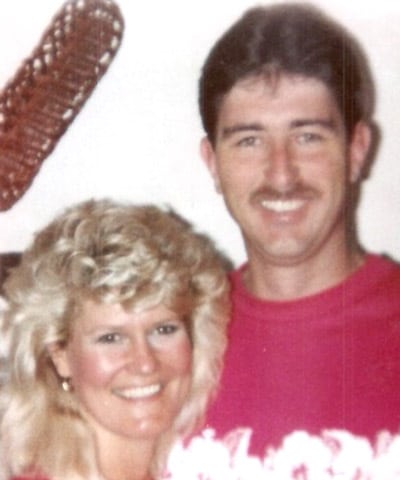 Through a strange series of events, in 1988 Lisa’s mother decided to sell her house and move from California to Bentonville, Arkansas to join the ministry of a televangelist out of Gravette. Lisa visited her over Thanksgiving, and her mom did everything she could to entice her to move to Arkansas too. One night during her visit, Lisa’s mother took her to a nightclub held in the Wonderland Cave in Bella Vista. Lisa was not in the mood to be there, but her mother continued encouraging her to have a few drinks and dance with some men. Two clean cut, attractive young men walked in, and Lisa bet her mother $1 that one of them was from California. Her mother, determined to prove her wrong and set her up with an Arkansas boy, went over to talk with them. Amazingly, one of the young men really was from California. His name was David Ray. He lived in Long Beach, and had come to Fayetteville, Arkansas to visit his mother for Thanksgiving. “We both had mothers in northwest Arkansas, he and I both lived in LA, and we hit it off instantly. I haven’t looked at another man since I saw him that night in 1988. I met my husband in a cave. We just celebrated our 27th anniversary.” David and Lisa got married soon after and moved from Los Angeles to Arkansas to be near their mothers. Lisa looked at Walmart and J.B. Hunt, but a friend introduced her to the president of Springdale Bank and Trust in Springdale (later to be called Arvest). He didn’t have anything available, but through him she got a job at the Bank of Bentonville (later to be called Arvest). She has remained with Arvest for twenty-seven years, working through the company to become the first female president and CEO of an Arvest bank, and now works as a regional executive for the company.
Through a strange series of events, in 1988 Lisa’s mother decided to sell her house and move from California to Bentonville, Arkansas to join the ministry of a televangelist out of Gravette. Lisa visited her over Thanksgiving, and her mom did everything she could to entice her to move to Arkansas too. One night during her visit, Lisa’s mother took her to a nightclub held in the Wonderland Cave in Bella Vista. Lisa was not in the mood to be there, but her mother continued encouraging her to have a few drinks and dance with some men. Two clean cut, attractive young men walked in, and Lisa bet her mother $1 that one of them was from California. Her mother, determined to prove her wrong and set her up with an Arkansas boy, went over to talk with them. Amazingly, one of the young men really was from California. His name was David Ray. He lived in Long Beach, and had come to Fayetteville, Arkansas to visit his mother for Thanksgiving. “We both had mothers in northwest Arkansas, he and I both lived in LA, and we hit it off instantly. I haven’t looked at another man since I saw him that night in 1988. I met my husband in a cave. We just celebrated our 27th anniversary.” David and Lisa got married soon after and moved from Los Angeles to Arkansas to be near their mothers. Lisa looked at Walmart and J.B. Hunt, but a friend introduced her to the president of Springdale Bank and Trust in Springdale (later to be called Arvest). He didn’t have anything available, but through him she got a job at the Bank of Bentonville (later to be called Arvest). She has remained with Arvest for twenty-seven years, working through the company to become the first female president and CEO of an Arvest bank, and now works as a regional executive for the company.
Lisa had recruiters call her with job offers over the years, but she always turned them down. “I always told them, ‘I don’t want to waste your time, there’s no way I’m leaving Arvest.’ If there’s some little issue at work, I never let it discourage me too much because this job’s culture fits me. I can’t see that I would fit as well anywhere else. You can’t throw money at it. Happiness and fulfillment are way more important.”
Lisa has always been driven by the desire to be a positive influence in people’s lives. “Arvest has been a great place to do that. When I left Pepsi, I wanted a job where I knew at the end of the day that there was something I did that changed someone’s life.” Lisa has had people return to the bank to thank her for suggesting they consider buying a house instead of continuing to rent, or for suggesting that they open a savings account. She has regularly been able to see the course of a person’s life change through her work. She has always wanted to encourage people to change their lives for the better, “one bite at a time.” “I learned about finance through my job and banking school, but most people don’t have a financial background. I felt like, if people were open to it, it was my job to help them with their financial future. I like coaching other associates and seeing them advance.”
Lisa says she owes her advancement in Arvest to this aim. “I never thought, I want to be a bank president. It just happened over time. I’ve never looked for the next job at Arvest–ever. Someone has always called me and said, ‘hey, you should apply for this job, it fits you to a T.’ I’ve always just been dragged along, but am happy and grateful for each move along the way. That’s how my whole career has gone. I just want to work hard and help other people. Other people have always seen potential in me that I didn’t see in myself. I have always been compelled to Pay Forward all of the nice things that others have done for me along the way that have improved my life.”
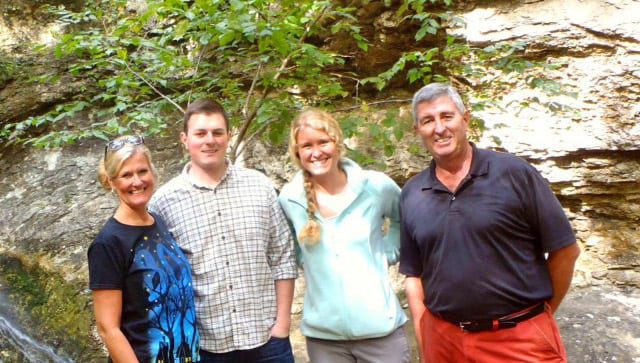

Emalie Cockrell
Contributing Author
Emalie Cockrell is a writer located in Fayetteville, Arkansas. She pursues writing fiction, as well as writing non-fiction about nature, traveling, running, Christianity, and real stories about real people. Watch for more of her work here on Backstory Boon.
Visit BackstoryBoon.com for the latest and upcoming real stories about real people.
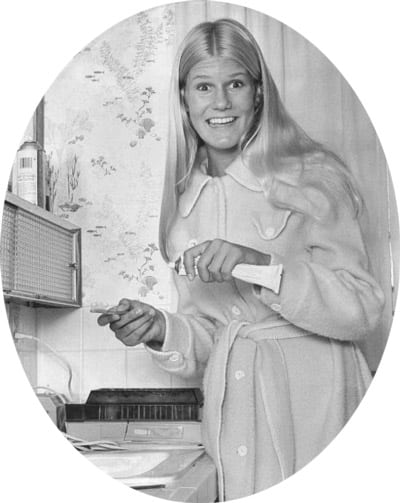
From Lisa’s Commerical Days (age 15)
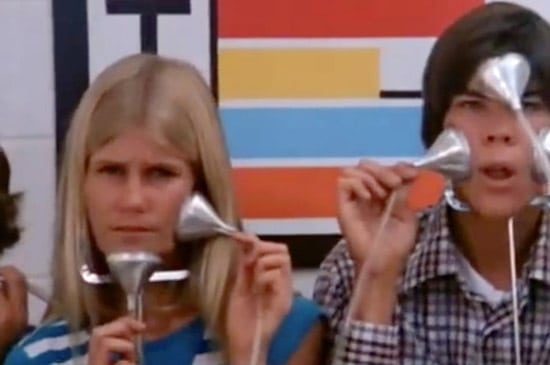
From Kentucky Fried Movie: Argon Oil Skit
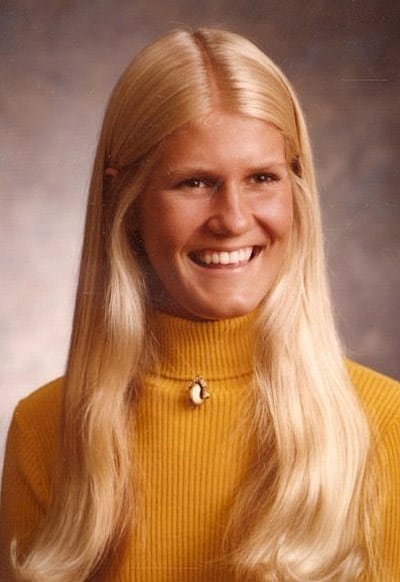
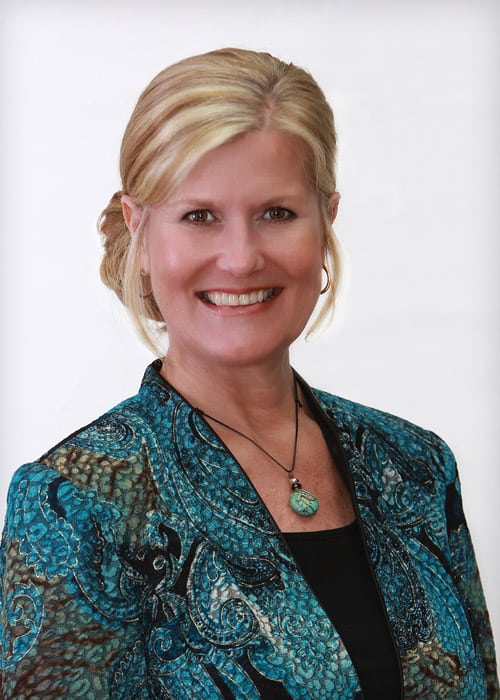
I have always been compelled to Pay Forward all of the nice things that others have done for me along the way that have improved my life.
~ Lisa Benson Ray
Lisa Benson Ray, regional executive of Arvest Bank in Springdale, was born and raised in California. Little did she know, she would live all over Los Angeles, miss a chance to appear in the first Rocky film, try to join the Navy, work for nine years to finish her Bachelor’s degree, meet her husband in a cave, move to northwest Arkansas, and eventually become one of Arvest Bank’s first female bank presidents.
Here’s her surprising, hilarious, and heart-warming backstory:
Lisa’s earliest memory is of her first lesson in right and wrong. She was three or four years old, and she envied a tiny, pink bicycle with training wheels that belonged to one of the neighborhood girls. One day when the girl’s family was away, Lisa snuck over to their house and “borrowed” it, hiding it in her own family’s garage. When her parents discovered it, they explained new truths to her that she hadn’t understood, that because the bike belonged to her friend, it was wrong for Lisa to take it and put it in their garage. Her parents made her walk back to the house with the bicycle, knock on the girl’s door, and apologize to both her and her parents. The little girl became Lisa’s first real friend, and her family taught Lisa another valuable lesson: they were the first African-American family Lisa had ever known. As Lisa spent time with their family, she learned at a very young age that all people are exactly alike, “all with red blood rolling through our veins.”

In tenth grade, after Lisa’s parents had divorced, she moved with her mother to North Hollywood and began attending high school in North Hollywood. “North Hollywood is where a lot of the movie industry people lived and sent their kids to school, but it wasn’t the super famous people. It was the people behind the camera. The show Little House on the Prairie was a big deal at the time, and a couple of girls in my math class were the daughters of the actor that played Mr. Edwards. My friend, Shannon Williams, was the niece of John Williams, the composer for Star Wars. That school was rough for me. I had never been exposed to drugs or alcohol. I was this blonde, naive girl. My first day, I met a girl in one of my classes who asked if I wanted to go smoke a cigarette in the bathroom with her. I said no, but she invited me to come anyway. She offered me a drug, but at first I thought it was candy and I will be forever grateful that I declined! I decided right away that it would be better to have no friends than the wrong friends. It was a completely different world from where I was raised.” After only one semester at North Hollywood High, Lisa transferred back to La Cañada High School, where her dad was a teacher. It was 30 miles away, so she used her mother’s car, dropped her mother off at work, drove to school, did homework for a couple of hours, picked her mother up from work, then she herself went to work. The school was one of the best in the state, which would serve Lisa well later on.
Lisa’s mother had always dreamed of being an actress. She had been the leading lady in every school play, and got into the movie industry once her kids were self-sufficient. She played leading roles in small movies, and small roles in bigger movies. She usually played an extra, and she pulled her children into that line of work too. Lisa says, “I never wanted to be in the movies, but I did it when I was a kid, because you could make more money doing that than working at Wienerschnitzel.” Lisa made it into a couple of episodes of the show Eight Is Enough, and played other small bit parts in the ‘70s and ‘80s.

Lisa also helped work on the first film of the Rocky trilogy. “Mom and I had this agent, Pearl, who did a lot of low-budget movies. If Pearl was looking for someone to help fill a stadium in a movie or something, she would call me, because she knew I didn’t want to try out for anything, I just wanted to show up and make $50 – $150 in a day. I was only fifteen, but Pearl and I had become friends. One day she called me and said, ‘I need to fill a forum for this low-budget movie, but they aren’t going to pay anyone. I know you won’t miss school to do it, but I want to pay you to help me think about it.’ I asked her to tell me more about it. She said, ‘Well, they’re going to bring in Kentucky Fried Chicken box lunches, and it’s for people who just want exposure in the movies.’ I asked, ‘Is there anyone in it that anyone would know?’ She said, ‘No, it’s really low-budget. The lead is this unknown named Sylvester Stallone. It’s really just for people who want to show up.’ I had the idea to call all the local school drama clubs to see if the teachers would let students participate as a project. Several of my friends from school did it, and you can see them clearly in the movie. I think Mom was in that one. I didn’t do it though. Later, when we all went to see it, we thought, ‘Wow, that was actually a pretty good movie!’”
 Lisa worked very hard to make good grades all through high school so that she could get college scholarships. She was valedictorian of her class. But no one–not her high school counselor, not her parents, none of her teachers–told her that she needed to actually apply for scholarships in order to get them, so she received none. When her acceptance letters came in, her family couldn’t afford to send her to the schools she wanted. A couple of years before, Lisa’s mother had married a millionaire who didn’t believe in college education, who had claimed her as a dependent, so she was also disqualified from all need-based scholarships. Lisa’s was determined go to college, so she quickly applied to less prestigious schools and was able to register at Cal State Northridge. “I think it cost maybe $250 a semester, at the time. I was able to scrounge it up. I think my mom helped me buy books my first semester.”
Lisa worked very hard to make good grades all through high school so that she could get college scholarships. She was valedictorian of her class. But no one–not her high school counselor, not her parents, none of her teachers–told her that she needed to actually apply for scholarships in order to get them, so she received none. When her acceptance letters came in, her family couldn’t afford to send her to the schools she wanted. A couple of years before, Lisa’s mother had married a millionaire who didn’t believe in college education, who had claimed her as a dependent, so she was also disqualified from all need-based scholarships. Lisa’s was determined go to college, so she quickly applied to less prestigious schools and was able to register at Cal State Northridge. “I think it cost maybe $250 a semester, at the time. I was able to scrounge it up. I think my mom helped me buy books my first semester.”
Lisa was only seventeen years old when she began college. A couple of months later, when she turned eighteen, her mother’s husband gave her a week or two to move out, on her own. Desperate, Lisa decided to join the Navy. She found a path that would allow her to serve for four years in exchange for the Navy paying for college tuition. She performed all the tests and physicals, and she had an appointment with the recruiter to sign her enrollment paper. The night before she officially enlisted, Lisa’s friend Linda invited her to have dinner at their house. “I thought I was just going to dinner. But Linda’s mom, Caroline, said, ‘Well, Lisa, I hear you’re joining the Navy.’
I said, ‘Yep, I’ve got an appointment at 8 o’clock tomorrow.’
She said, ‘That’s nice. But do you feel like this is the same decision you would make if you had three months to decide?’
I said, ‘There’s no doubt, if I had three months I would not be joining the Navy. But in a week I won’t have a place to live. My job won’t support me. This will provide all the things I need.’
Then Caroline said, ‘How about this: Linda and I have talked about it, and her room is big enough for two girls. Why don’t you stay with us and pay us rent, maybe $100 a month, and just stay for three months. Then, in three months, if you still want to join the Navy, at least you had some time to think about it.’
“So I moved in with them for three months. I got a full time job during the day at Coldwell Banker Real Estate, and I was taking night classes. I was trying to figure out what I could afford. I looked at a bulletin board at my college, and I found one room I could afford. It was a two bedroom apartment, and I would be the fourth person. Turns out, three guys shared the big master bedroom, and there was a teeny tiny side room with a bathroom where I would live. So I moved in. It was very much like The Big Bang Theory. Those three boys were just like the guys on the show. They thought it was the coolest thing ever to have a girl roommate.
“When I was moving in, Caroline gave me a card, and in it was the $300 I had paid her for rent. She said, ‘Lisa, it is really hard for people to have a rainy day fund. So this is for your rainy day fund. Put as much of it aside as you can.’ About a month later, the transmission blew on my 1970 Ford Torino, and it took almost every bit of that $300 to pay for it. If she had not done that for me, I don’t know what I would have done. Caroline taught me about saving money, but she also taught me another lesson: before the phrase was even around, she told me to pay it forward. That’s always been in my mind.”
Lisa’s story meanders a bit: after her freshman year at Cal State Northridge, her father decided to divorce his fourth wife and offered to let Lisa stay with him for free in his apartment in Glendale. She stayed on his couch and went to Glendale Community College full time, working on campus. She got very involved at Glendale: she became women’s student president, then student body president. Then, she got a full ride to Brigham Young University at Provo. She spent a year there. Lisa wasn’t active in the Mormon church, but she loved her time there. Then she took some time off of school and got a full-time job at Pepsi-Cola. She got several promotions, but finally reached a point where she could not be further promoted without a degree. Pepsi generously offered to pay for her to finish her degree. All in all, it took Lisa nine years and four schools to earn her college degree. But she finished. She went on later to earn a graduate degree in banking.
Anyone who looks at Lisa’s life can see that she has a strong sense of values, a powerful work ethic, and high standards for herself. She says these personal values had complicated roots. Her father always told her, “Lisa, you can do whatever you put your mind to.” He helped her accomplish her goals as much as possible, even when he didn’t have money. However, she also had negative examples: many women in her life were in unhealthy relationships and felt powerless to change because they didn’t think they could support themselves. “The thing that motivated me more than anything else was telling myself that I would never settle for an unhappy relationship. I was going to do whatever it took to be self-sufficient, and then I would consider a man. I had women in my life who thought, ‘I’ve gotta find me a man who can support me,’ and then no matter how bad the relationship was, they felt trapped. I wasn’t going to do that. I wanted to be happy and self-sufficient, and if I found a man who fit into that, then way to go.”
 Through a strange series of events, in 1988 Lisa’s mother decided to sell her house and move from California to Bentonville, Arkansas to join the ministry of a televangelist out of Gravette. Lisa visited her over Thanksgiving, and her mom did everything she could to entice her to move to Arkansas too. One night during her visit, Lisa’s mother took her to a nightclub held in the Wonderland Cave in Bella Vista. Lisa was not in the mood to be there, but her mother continued encouraging her to have a few drinks and dance with some men. Two clean cut, attractive young men walked in, and Lisa bet her mother $1 that one of them was from California. Her mother, determined to prove her wrong and set her up with an Arkansas boy, went over to talk with them. Amazingly, one of the young men really was from California. His name was David Ray. He lived in Long Beach, and had come to Fayetteville, Arkansas to visit his mother for Thanksgiving. “We both had mothers in northwest Arkansas, he and I both lived in LA, and we hit it off instantly. I haven’t looked at another man since I saw him that night in 1988. I met my husband in a cave. We just celebrated our 27th anniversary.” David and Lisa got married soon after and moved from Los Angeles to Arkansas to be near their mothers. Lisa looked at Walmart and J.B. Hunt, but a friend introduced her to the president of Springdale Bank and Trust in Springdale (later to be called Arvest). He didn’t have anything available, but through him she got a job at the Bank of Bentonville (later to be called Arvest). She has remained with Arvest for twenty-seven years, working through the company to become the first female president and CEO of an Arvest bank, and now works as a regional executive for the company.
Through a strange series of events, in 1988 Lisa’s mother decided to sell her house and move from California to Bentonville, Arkansas to join the ministry of a televangelist out of Gravette. Lisa visited her over Thanksgiving, and her mom did everything she could to entice her to move to Arkansas too. One night during her visit, Lisa’s mother took her to a nightclub held in the Wonderland Cave in Bella Vista. Lisa was not in the mood to be there, but her mother continued encouraging her to have a few drinks and dance with some men. Two clean cut, attractive young men walked in, and Lisa bet her mother $1 that one of them was from California. Her mother, determined to prove her wrong and set her up with an Arkansas boy, went over to talk with them. Amazingly, one of the young men really was from California. His name was David Ray. He lived in Long Beach, and had come to Fayetteville, Arkansas to visit his mother for Thanksgiving. “We both had mothers in northwest Arkansas, he and I both lived in LA, and we hit it off instantly. I haven’t looked at another man since I saw him that night in 1988. I met my husband in a cave. We just celebrated our 27th anniversary.” David and Lisa got married soon after and moved from Los Angeles to Arkansas to be near their mothers. Lisa looked at Walmart and J.B. Hunt, but a friend introduced her to the president of Springdale Bank and Trust in Springdale (later to be called Arvest). He didn’t have anything available, but through him she got a job at the Bank of Bentonville (later to be called Arvest). She has remained with Arvest for twenty-seven years, working through the company to become the first female president and CEO of an Arvest bank, and now works as a regional executive for the company.
Lisa had recruiters call her with job offers over the years, but she always turned them down. “I always told them, ‘I don’t want to waste your time, there’s no way I’m leaving Arvest.’ If there’s some little issue at work, I never let it discourage me too much because this job’s culture fits me. I can’t see that I would fit as well anywhere else. You can’t throw money at it. Happiness and fulfillment are way more important.”
Lisa has always been driven by the desire to be a positive influence in people’s lives. “Arvest has been a great place to do that. When I left Pepsi, I wanted a job where I knew at the end of the day that there was something I did that changed someone’s life.” Lisa has had people return to the bank to thank her for suggesting they consider buying a house instead of continuing to rent, or for suggesting that they open a savings account. She has regularly been able to see the course of a person’s life change through her work. She has always wanted to encourage people to change their lives for the better, “one bite at a time.” “I learned about finance through my job and banking school, but most people don’t have a financial background. I felt like, if people were open to it, it was my job to help them with their financial future. I like coaching other associates and seeing them advance.”
Lisa says she owes her advancement in Arvest to this aim. “I never thought, I want to be a bank president. It just happened over time. I’ve never looked for the next job at Arvest–ever. Someone has always called me and said, ‘hey, you should apply for this job, it fits you to a T.’ I’ve always just been dragged along, but am happy and grateful for each move along the way. That’s how my whole career has gone. I just want to work hard and help other people. Other people have always seen potential in me that I didn’t see in myself. I have always been compelled to Pay Forward all of the nice things that others have done for me along the way that have improved my life.”

Visit BackstoryBoon.com for the latest and upcoming real stories about real people.

From Lisa’s Commerical Days (age 15)

From Kentucky Fried Movie: Argon Oil Skit


I have always been compelled to Pay Forward all of the nice things that others have done for me along the way that have improved my life.
~ Lisa Benson Ray

Emalie Cockrell
Contributing Author
Emalie Cockrell is a writer located in Fayetteville, Arkansas. She pursues writing fiction, as well as writing non-fiction about nature, traveling, running, Christianity, and real stories about real people. Watch for more of her work here on Backstory Boon.




